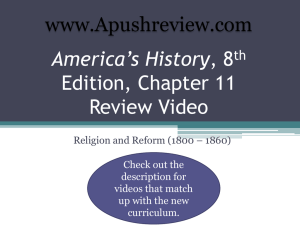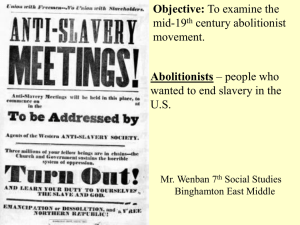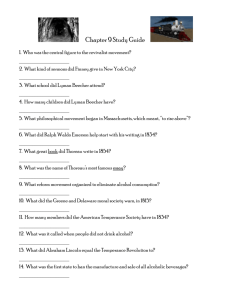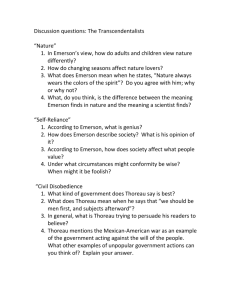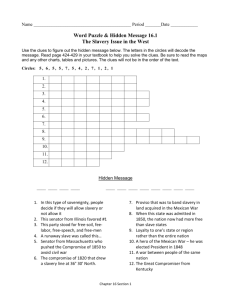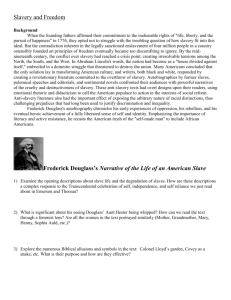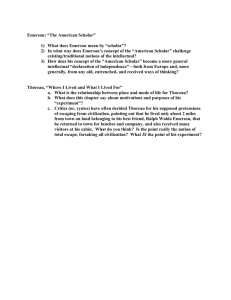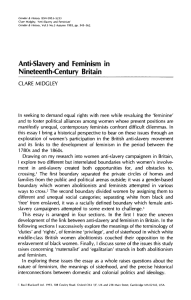Romantic Era Timeline
advertisement
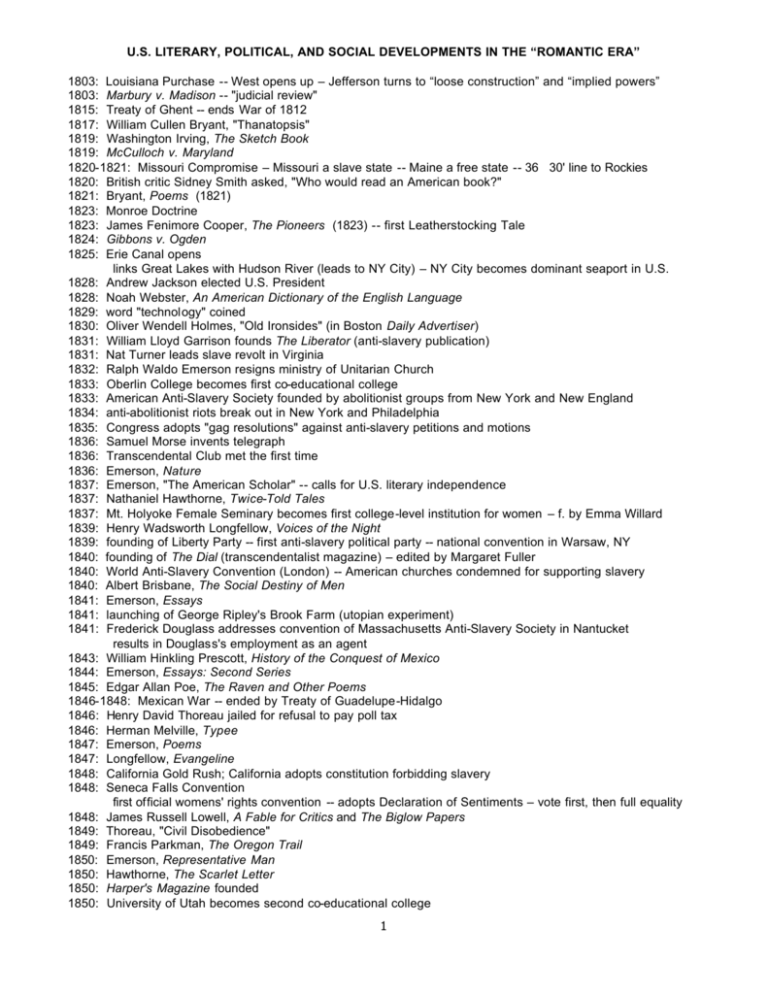
U.S. LITERARY, POLITICAL, AND SOCIAL DEVELOPMENTS IN THE “ROMANTIC ERA” 1803: Louisiana Purchase -- West opens up – Jefferson turns to “loose construction” and “implied powers” 1803: Marbury v. Madison -- "judicial review" 1815: Treaty of Ghent -- ends War of 1812 1817: William Cullen Bryant, "Thanatopsis" 1819: Washington Irving, The Sketch Book 1819: McCulloch v. Maryland 1820-1821: Missouri Compromise – Missouri a slave state -- Maine a free state -- 36 30' line to Rockies 1820: British critic Sidney Smith asked, "Who would read an American book?" 1821: Bryant, Poems (1821) 1823: Monroe Doctrine 1823: James Fenimore Cooper, The Pioneers (1823) -- first Leatherstocking Tale 1824: Gibbons v. Ogden 1825: Erie Canal opens links Great Lakes with Hudson River (leads to NY City) – NY City becomes dominant seaport in U.S. 1828: Andrew Jackson elected U.S. President 1828: Noah Webster, An American Dictionary of the English Language 1829: word "technology" coined 1830: Oliver Wendell Holmes, "Old Ironsides" (in Boston Daily Advertiser) 1831: William Lloyd Garrison founds The Liberator (anti-slavery publication) 1831: Nat Turner leads slave revolt in Virginia 1832: Ralph Waldo Emerson resigns ministry of Unitarian Church 1833: Oberlin College becomes first co-educational college 1833: American Anti-Slavery Society founded by abolitionist groups from New York and New England 1834: anti-abolitionist riots break out in New York and Philadelphia 1835: Congress adopts "gag resolutions" against anti-slavery petitions and motions 1836: Samuel Morse invents telegraph 1836: Transcendental Club met the first time 1836: Emerson, Nature 1837: Emerson, "The American Scholar" -- calls for U.S. literary independence 1837: Nathaniel Hawthorne, Twice-Told Tales 1837: Mt. Holyoke Female Seminary becomes first college-level institution for women – f. by Emma Willard 1839: Henry Wadsworth Longfellow, Voices of the Night 1839: founding of Liberty Party -- first anti-slavery political party -- national convention in Warsaw, NY 1840: founding of The Dial (transcendentalist magazine) – edited by Margaret Fuller 1840: World Anti-Slavery Convention (London) -- American churches condemned for supporting slavery 1840: Albert Brisbane, The Social Destiny of Men 1841: Emerson, Essays 1841: launching of George Ripley's Brook Farm (utopian experiment) 1841: Frederick Douglass addresses convention of Massachusetts Anti-Slavery Society in Nantucket results in Douglass's employment as an agent 1843: William Hinkling Prescott, History of the Conquest of Mexico 1844: Emerson, Essays: Second Series 1845: Edgar Allan Poe, The Raven and Other Poems 1846-1848: Mexican War -- ended by Treaty of Guadelupe-Hidalgo 1846: Henry David Thoreau jailed for refusal to pay poll tax 1846: Herman Melville, Typee 1847: Emerson, Poems 1847: Longfellow, Evangeline 1848: California Gold Rush; California adopts constitution forbidding slavery 1848: Seneca Falls Convention first official womens' rights convention -- adopts Declaration of Sentiments – vote first, then full equality 1848: James Russell Lowell, A Fable for Critics and The Biglow Papers 1849: Thoreau, "Civil Disobedience" 1849: Francis Parkman, The Oregon Trail 1850: Emerson, Representative Man 1850: Hawthorne, The Scarlet Letter 1850: Harper's Magazine founded 1850: University of Utah becomes second co-educational college 1 1850: 1850: 1851: 1851: 1851: 1852: 1853: 1853: 1854: "Compromise of 1850" – California a free state, slave trade abolished in D.C., stricter fugitive slave law Lucy Stone becomes first female to earn college degree (Oberlin College) Charles Sumner becomes U.S. Senator from Massachusetts – leads fight against slavery Herman Melville, Moby-Dick Parkman, History of the Conspiracy of Pontiac Harriet Beecher Stowe, Uncle Tom's Cabin New York and Chicago connected by railroad Frederick Douglass, Heroic Slave (1853) Kansas-Nebraska Act Missouri Compromise unconstitutional "popular sovereignty": all territories can decide to permit or prohibit slavery wipes out Whig Party and Northern wing of Democrats 1854: beginnings of Republican Party -- anti-slavery 1854: Thoreau, Walden 1855: Walt Whitman, Leaves of Grass (beginning) 1855: Longfellow, The Song of Hiawatha 1855: Douglass, My Bondage and My Freedom 1857: Dred Scott Case -- decision by U.S. Supreme Court fugitive slaves in free states are not free -- Congress without power to prohibit slavery in territories court says Missouri Compromise had always been unconstitutional 1857: Atlantic Monthly founded 1858: Lincoln-Douglas Debates 1859: Charles Darwin, Origin of Species (Britain) 1859: John Brown's Raid on Harper's Ferry, VA – Brown hanged: Hero/Martyr to North and Traitor to South 1859: first oil well (Titusville, PA) 1860: South Carolina secedes from Union 1860: Abraham Lincoln elected U.S. President 1861: telegraph links California to the East 1861-1865: Civil War 1862: Emancipation Proclamation (after Battle of Antietam) 1863: Gettysburg Address 1865: Lincoln assassinated (Ford's Theater, Washington, D.C., by John Wilkes Booth) 1866: John Greenleaf Whittier, Snowbound 1867: Alaska Purchase (Seward Purchase) 1869: first transcontinental railroad (Central Pacific and Union Pacific meet at Promontory Point, Utah) National Growth 1810: 17 states -- population ~7 million -- population center: Eastern seaboard 1861: 34 states -- population ~30 million -- population center: Ohio 2
